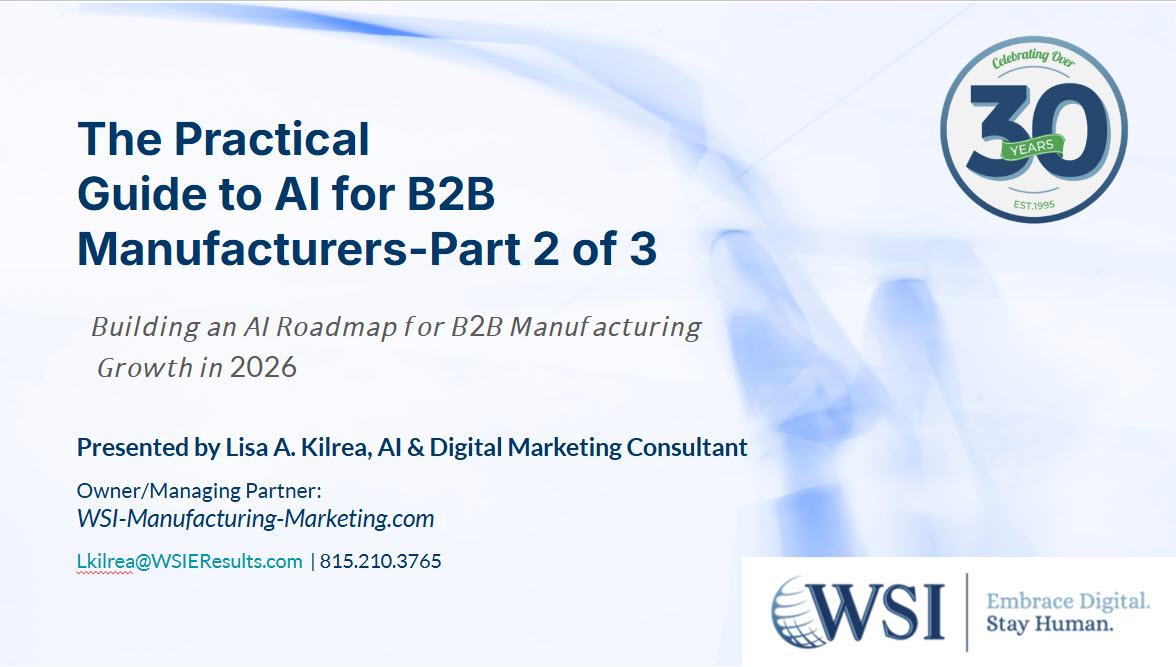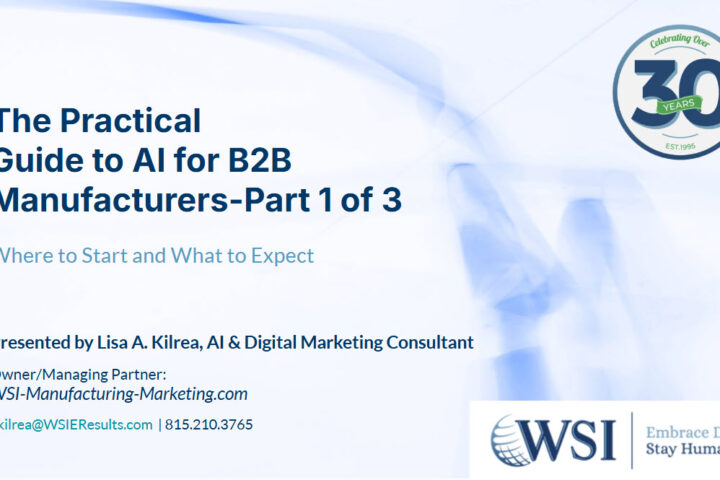Download The Slides Here
Artificial intelligence isn’t just for tech giants anymore. From small manufacturers to large-scale production facilities, AI is rapidly becoming a tool that drives efficiency, reduces costs, and creates smarter, more agile businesses.
But what does “using AI” actually mean?
That question is exactly what Lisa Kilrea, President of WSI EResults, tackled in Session 2 of the AI for Manufacturers webinar series. She introduced what WSI calls the AI Use Spectrum. It’s a simple, structured way to understand how manufacturers can adopt AI step-by-step, moving from basic automation to full business transformation.
Stage 1: Built-In AI (The Easiest Place to Start)
Many manufacturers are already using AI without realizing it. The platforms you rely on every day, like CRMs, ERPs, HR systems, and even customer service tools often have AI capabilities quietly working in the background.
Think of features like:
- Chatbots that answer common customer questions instantly
- Predictive text or “smart suggestions” in your email or help desk software
- Automated recommendations in your ERP system
These features save time, reduce manual work, and improve response times without needing an in-house team. It’s the lowest-risk, fastest-return way to start exploring AI.
Stage 2: Semi-Custom AI (Solving Specific Problems)
Once you’ve seen what built-in AI can do, the next step is tailoring it to your business. Semi-custom AI layers smart automation over your existing systems connecting data sources, generating alerts, and streamlining workflows.
For example, AI-driven inventory alerts can monitor stock levels in real time, predicting shortages before they happen. That means fewer production stoppages, lower costs, and smoother operations.
This stage doesn’t require brand-new software just smart integration between the tools you already use.
Stage 3: Predictive Intelligence (AI for Insight)
This is where AI moves from automation to decision-making support.
Instead of relying on gut instincts or outdated spreadsheets, manufacturers can use AI for demand forecasting, trend analysis, and financial modeling.
Imagine knowing weeks in advance when customer demand is likely to spike or when market changes might impact your supply chain. That’s the power of predictive intelligence. It’s helping you stay proactive, not reactive.
Stage 4: Custom AI (Optimization at Scale)
By Stage 4, companies are using custom-built AI systems designed around their unique workflows.
These solutions can:
- Optimize energy use across production lines
- Improve supply chain visibility
- Automate pricing decisions or resource allocation
For manufacturers facing rising costs from energy, materials, and labor, custom AI can uncover massive efficiency gains while supporting sustainability goals. It’s not just about doing things faster, it’s about doing them smarter.
Stage 5: AI Co-Pilots (Transformation Level)
At the far end of the spectrum is where things get truly transformative: AI co-pilots.
These advanced systems act as digital business partners. They’re analyzing data, generating insights, and even recommending or executing actions in real time.
For example, a finance co-pilot can instantly model scenarios like rising material costs or supplier delays and recommend strategic adjustments. Instead of waiting weeks for reports, decision-makers get immediate, data-backed guidance.
At this stage, AI doesn’t just support your team, it amplifies it.
Why Strategy Comes First
While the potential of AI is exciting, Lisa Kilrea emphasized one key truth: success doesn’t come from random experiments or isolated tools. It comes from strategy.
Before jumping into implementation, manufacturers need to understand where AI can have the biggest impact. They need to examine which processes to automate, which insights to pursue, and how to measure ROI.
That’s why WSI recommends starting with an AI Readiness Assessment.
Get Your AI Readiness Assessment
The AI Readiness Assessment is a 45–60 minute discovery session where WSI’s experts explore your current operations, technology, and opportunities for AI adoption.
You’ll receive a comprehensive report (valued at $1,500) outlining:
- Areas where AI can deliver the fastest ROI
- Recommended automation and insight tools
- ROI and cost/benefit analysis
- A practical roadmap to guide your next steps
This is the smartest way to begin your AI journey — with a clear strategy and measurable goals.




